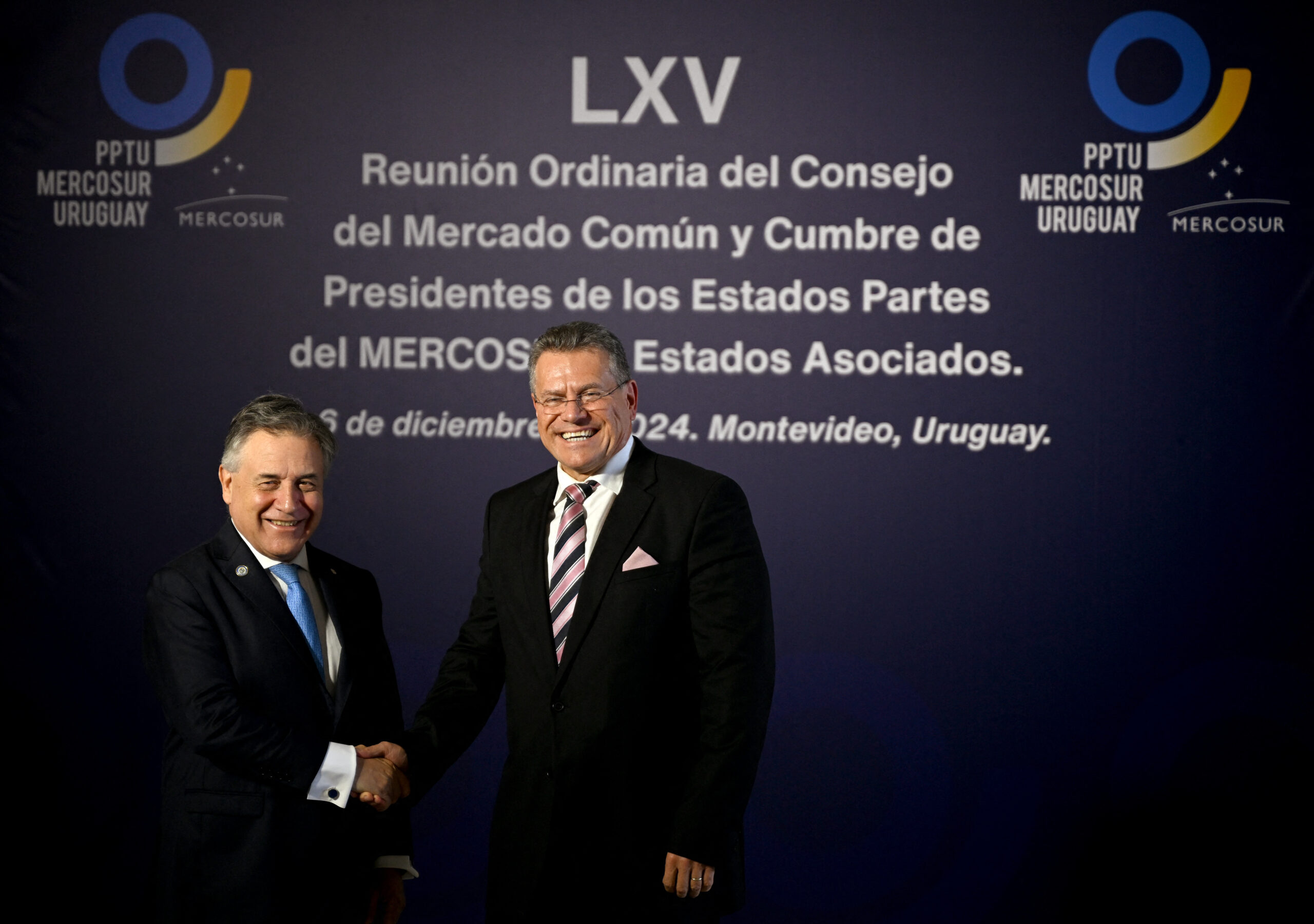Brussels – A perfect astral alignment, the best that Ursula von der Leyen could have wished for closing once and for all the EU-Mercosur free trade agreement. So it happens that just as France, the main opponent of the agreement among the 27 member countries, is experiencing the deepest political crisis of the Fifth Republic, the four Mercosur countries—Brazil, Argentina, Uruguay and Paraguay—are meeting for a summit in Montevideo. And the president of the European Commission, together with Trade Commissioner Maroš Šefčovič and her negotiating team, has already landed in Latin America to sign the trade pact.
“The finish line is now near,” the EU leader tweeted as soon as she set foot in Uruguay. “We have the opportunity to create a market of 700 million people, the largest trade and investment partnership the world has ever seen,” she added. Von der Leyen, who had already tried to close the game during the G20 in Brazil last month, wants to hear no arguments: after 25 years of negotiations and a political agreement reached and set aside in 2019, the final opening of markets with Mercosur must bear her signature. “Both regions will benefit,” the president of the EU executive continues to argue—an argument not unanimously shared by European capitals and different industry sectors.
Touchdown in Latin America
The finish line of the EU-Mercosur agreement is in sight.
Let’s work, let’s cross it.
We have the chance to create a market of 700 million people.
The largest trade and investment partnership the world has ever seen.
Both regions will benefit.
– Ursula von der Leyen (@vonderleyen) il mese scorso
What the EU-Mercosur agreement provides

In essence, the deal would provide for the gradual elimination of 92 per cent of tariffs for imports from Mercosur and 91 per cent for European exports. According to data from the European Commission, in 2023, EU exports to the four Latin American countries amounted to 55.7 billion euros, while Argentina, Brazil, Uruguay, and Paraguay exported goods worth 53.7 billion euros to the EU.
While the European Union exports automobiles, machinery, computer equipment, textiles, chocolate, liquor and wine to the Andean continent, mainly agricultural and fish products, beef and poultry travel in the opposite direction. Brussels—committed to the race for critical raw materials and determined to reduce overdependence on China to fulfil the green transition— is also interested in important overseas mineral resources, such as lithium, graphite, nickel, and manganese.
Simplifying, the agreement is considered very beneficial to the automotive and machinery industry. Still, it is particularly disliked by the European agricultural sector, which denounces the lack of “mirror clauses” capable of protecting producers in EU countries from being wiped out by their South American colleagues and their goods with much lower production costs. In essence, full reciprocity in terms of commitments, requirements, and standards would be lacking. While the EU imposes very tight constraints on its farmers from an environmental and labour organization standpoint, such obligations are not required of the four Mercosur countries.
France leads the no front. Macron: “Unacceptable agreement as it is”
Leading the barricades against the agreement are countries boasting a strong industrial agricultural sector. French President Emmanuel Macron, grappling at home with the collapse of the Michel Barnier-led government, immediately reiterated to Ursula von der Leyen that the agreement is “unacceptable as it is”. The Elysée added in a post on X that France “will continue to tirelessly defend its agricultural sovereignty.” To boycott the agreement, Paris can count on the concerns of Ireland, the world’s fifth-largest beef exporter, Belgium, and Poland.

And most likely on Italy, although the position of Giorgia Meloni’s government changes nuance every time a minister speaks on the issue. If the leader of Forza Italia, Antonio Tajani, claims that Rome “is “favourable in principle” to the agreement, the allies of Lega and Fratelli d’Italia are much more critical. After the words of the Minister for Agriculture, Francesco Lollobrigida, who had called the text of the agreement “not agreeable,” the Minister of Transport and leader of the Carroccio, Matteo Salvini, today in Brussels for the EU Transport Council, also had his say. “All the farmers of Europe are saying no to a trade agreement that risks bringing a sector to its knees, and I am attentive to the concerns of farmers,” the deputy prime minister claimed, closing, “The agreement has been at a standstill for years, and not by accident; it would be right for it to remain still.”
Brussels pulls straight and trusts in the support of the 27
If tomorrow von der Leyen wrests a yes vote from the four South Americans, she would only be halfway through the task. Then, the text would have to go through the scrutiny of EU capitals again, with the risk that a blocking minority—four member states representing at least 35 per cent of the European population—would send it back to the drawing board.
EU executive spokesman for agriculture and trade, Olof Gill, recalled today that “the Commission has negotiated with Mercosur on the basis of a mandate received from our member states.” During the most recent negotiations, he specified, “We insisted on the will to strengthen sustainable environment and climate.” For this reason, the European Commission is optimistic that “if we reach a final agreement, it will be supported by all our member states.”
Also speaking in support of the agreement was German socialist Bernd Lange, chairman of the European Parliament’s International Trade Committee. “With the global economy likely to face turbulent times in the near future, the current EU-Mercosur agreement would be a beacon of hope for the EU. Not only would it provide additional export opportunities, but it would further anchor our political and economic relations with the Mercosur countries,” the MEP explained, urging the still reticent governments to “let reason prevail over emotion” because “the overall consequences of a no-deal would likely far outweigh the shortcomings of a flawed agreement.”
English version by the Translation Service of Withub
![Bernd Lange, presidente della commissione Commercio internazionale del Parlamento europeo [foto: European Parliament]](https://www.eunews.it/wp-content/uploads/2024/12/lange-350x250.jpg)
![Trattori, proteste e critiche degli agricoltori per l'intenzione di chiudere l'accordo Ue-Mercosur [Bruxelles, 13 novembre 2024. Foto: Emanuele Bonini]](https://www.eunews.it/wp-content/uploads/2024/11/fugea241113-350x250.jpeg)






![Nicola Procaccini, co-presidente del gruppo Ecr [Strasburgo, 11 febbraio 2025. Foto: ]](https://www.eunews.it/wp-content/uploads/2025/02/procaccini-120x86.png)